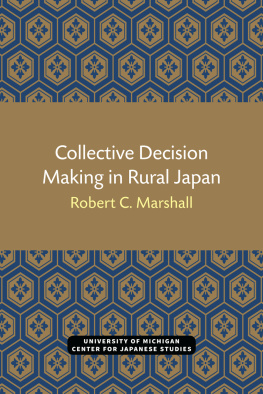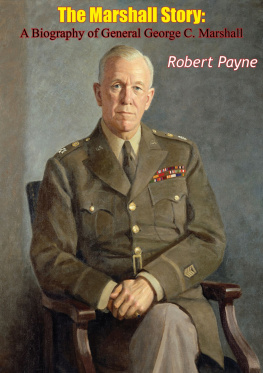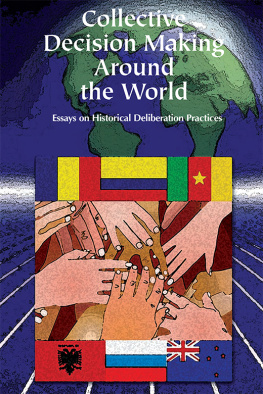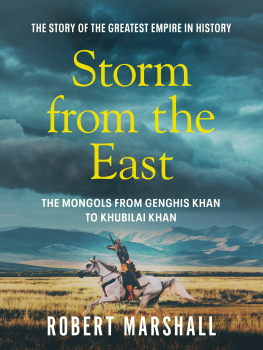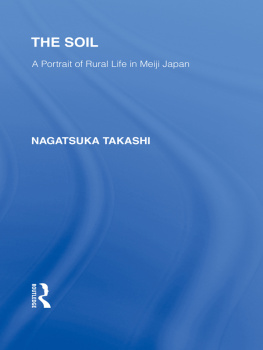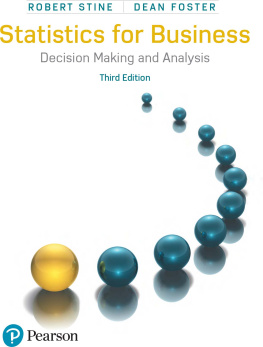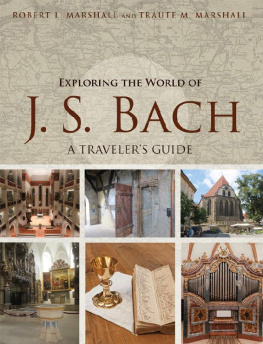Robert C. Marshall - Collective Decision Making in Rural Japan
Here you can read online Robert C. Marshall - Collective Decision Making in Rural Japan full text of the book (entire story) in english for free. Download pdf and epub, get meaning, cover and reviews about this ebook. year: 2020, publisher: University of Michigan Center for Japanese Studies, genre: Romance novel. Description of the work, (preface) as well as reviews are available. Best literature library LitArk.com created for fans of good reading and offers a wide selection of genres:
Romance novel
Science fiction
Adventure
Detective
Science
History
Home and family
Prose
Art
Politics
Computer
Non-fiction
Religion
Business
Children
Humor
Choose a favorite category and find really read worthwhile books. Enjoy immersion in the world of imagination, feel the emotions of the characters or learn something new for yourself, make an fascinating discovery.
- Book:Collective Decision Making in Rural Japan
- Author:
- Publisher:University of Michigan Center for Japanese Studies
- Genre:
- Year:2020
- Rating:4 / 5
- Favourites:Add to favourites
- Your mark:
- 80
- 1
- 2
- 3
- 4
- 5
Collective Decision Making in Rural Japan: summary, description and annotation
We offer to read an annotation, description, summary or preface (depends on what the author of the book "Collective Decision Making in Rural Japan" wrote himself). If you haven't found the necessary information about the book — write in the comments, we will try to find it.
Collective Decision Making in Rural Japan — read online for free the complete book (whole text) full work
Below is the text of the book, divided by pages. System saving the place of the last page read, allows you to conveniently read the book "Collective Decision Making in Rural Japan" online for free, without having to search again every time where you left off. Put a bookmark, and you can go to the page where you finished reading at any time.
Font size:
Interval:
Bookmark:

THE UNIVERSITY OF MICHIGAN CENTER FOR JAPANESE STUDIES
MICHIGAN PAPERS IN JAPANESE STUDIES
NO. 11
MICHIGAN PAPERS IN JAPANESE STUDIES
No. 1. Political Leadership in Contemporary Japan, edited by Terry Edward MacDougall.
No. 2. Parties, Candidates and Voters in Japan: Six Quantitative Studies, edited by John Creighton Campbell.
No. 3. The Japanese Automobile Industry: Model and Challenge for the Future?, edited by Robert E. Cole.
No. 4. Survey of Japanese Collections in the United States, 19791980, by Naomi Fukuda.
No. 5. Culture and Religion in Japanese-American Relations: Essays on Uchimura Kanz, 18611930, edited by Ray A. Moore.
No. 6. Sukerokus Double Identity: The Dramatic Structure of Edo Kabuki, by Barbara E. Thornbury.
No. 7. Industry at the Crossroads, edited by Robert E. Cole.
No. 8. Treelike: The Poetry of Kinoshita Yji, translated by Robert Epp.
No. 9. The New Religions of Japan: A Bibliography of Western-Language Materials, by H. Byron Earhart.
No. 10. Automobiles and the Future: Competition, Cooperation, and Change, edited by Robert E. Cole.
No. 11. Collective Decision Making in Rural Japan, by Robert C. Marshall.
COLLECTIVE DECISION MAKING IN RURAL JAPAN
by
Robert C. Marshall
Ann Arbor
Center for Japanese Studies
The University of Michigan
1984
ISBN 0-939512-17-3
Copyright 1984
Center for Japanese Studies
The University of Michigan
108 Lane Hall
Ann Arbor, MI 48109
All rights reserved
Library of Congress Cataloging in Publication Data
Marshall, Robert C., 1948
Collective decision making in rural Japan.
(Michigan papers in Japanese studies; no. 11)
Bibliography: p. 171.
1. Aichi-ken (Japan)Rural conditionsCase studies. 2. Decision making, GroupJapanAichi-kenCase studies. 3. Local governmentJapanAichi-kenCase studies. 4. VillagesJapanAichi-kenCase studies. I. Title. II. Series.
HN730.A34M37 1984 302.3095216 84-3159
ISBN 0-939512-17-3
Printed in the United States of America
ISBN 978-0-939512-17-1 (paper)
ISBN 978-0-472-12804-4 (ebook)
ISBN 978-0-472-90199-9 (open access)
Open access edition funded by the National Endowment for the Humanities / Andrew W. Mellon Foundation Humanities Open Book Program
The text of this book is licensed under a Creative Commons Attribution-NonCommercial-NoDerivatives 4.0 International License: https://creativecommons.org/licenses/by-nc-nd/4.0/
CONTENTS
The origins of this study of rural Japanese decision making lie in my nearly simultaneous discoveries of Niwa Fumios fine novel of rural passion and intrigue, The Buddha Tree, and the transactional analysis of social relations and organizations, or, as it is sometimes called, social exchange theory, which was made especially prominent in political science by Olson (1956), in sociology by Blau (1964), and in anthropology by Barth (1966). Thus, this is a book written with two rather disparate audiences in mind, readers interested primarily in exchange and decision-making phenomena, on the one hand, and readers interested primarily in the unity of experience represented by the Japanese sensibility, on the other.
It is not for me to judge how deftly or ineptly I have combined these two interests in this one study, but I cannot pretend to believe that either audience will be entirely satisfied with the result. To the latter, the ethnography will be thin where it should be thick, and the argument will be abstract where it should be concrete. To the former readers, the argument will be incomplete where it should be rigorous, and the ethnography insupportably baroque where it should be Bauhaus.
To readers on both wings I can only respond that the people I watched and questioned made their decisions on the basis of a common sense that was not the same as mine. I have therefore tried throughout this study to portray as closely as possible that common sense in action while seeking to generate its double through analysis of hamlet social relations and organization by means of general principles of exchange. It is the major task of anthropology to make explicit those widely held implicit assumptions of a culture that make day-to-day social living possible and to search out the sources of those assumptions. The methods of the discipline remain crude, even violent, like those of physicists who study subatomic particles: smash together some atoms, or individuals from different cultures, and see what results. The effect in both cases is unavoidably reciprocal and impossible to wholly control; ones instruments are altered during the experiment. A rather left-handed complement that I treasure most from this clash of cultures came to me toward the end of my stay in Japan by way of a third party. A Japanese woman who had lived several years in the United States as a student, who knew me well, and who did not care so very much for Americans made a remark at a party I did not attend. Sometimes, she said about me, he seems so Japanese I dont see how he can manage to get by at all in America. On the contrary, at first, I did not see how I was going to get by in Japan, and I never would have if not for the immeasurable assistance of many people from many walks of life.
This study is the result of three continuous years of fieldwork in a hamlet in rural Japan. The data presented and analyzed here consist of records from participant observation, formal and informal interviews, casual conversation and formal questionnaires, and public and private documents. Before all other obligations, I must express my deep gratitude to the people of Nohara hamlet and Kawasemigawa ward, who were my friends and teachers. They not only tolerated my research and answered with thought and good humor questions I would now be far too embarrassed to ever ask again but also encouraged my research and made a place for my wife and myself in their community, homes, and lives. But an expression of gratitude is not a return. I cannot hope to repay even the smallest part of their consistent kindness, patience, cooperation, and hospitality.
The subject of this research is group decision making, and the results of this process are, after all, a matter of public record. I do not think there are any data in this study that are unknown to all interested residents of Nohara hamlet. But what is public within the confines of the hamlet is by no means necessarily public outside the hamlet. In focusing on the process through which alternative courses of action and policies are publicly selected, I have especially tried to record the who said what and when of hamlet meetings and private conversations. A significant part of the overall process of decision making in rural Japan, however, is the forgetting of this same information once a decision is made. To the extent I have preserved in this study statements and sentiments never meant for ears outside the hamlet, the need to disguise their authors increases. Where I must fail in a public expression of gratitude to my friends and informants, I must not also fail in discretion. To prevent the identification of individuals whose speech and behavior I have recorded in this study from becoming publicly known, all personal and local place names have been changed, with the exception of the prefecture in which the fieldwork was undertaken.
In addition to specific debts of gratitude to informants who cannot be publicly acknowledged, there remains the pleasure of recognizing another set of financial, intellectual, and emotional obligations. I wish to thank the University of Pittsburgh Andrew W. Mellon Fund for two one-year predoctoral fellowships and the U.S. Department of Education for a twelve-month Fulbright-Hays Predoctoral Dissertation Research Abroad Fellowship. These three awards met the great bulk of my fieldwork expenses. Thanks are also due the C. Itoh Company for a travel and subsistence grant, and the Japan Iron and Steel Federation Endowment Fund of the University of Pittsburgh for a grant for the preparation of this manuscript. Both grants were received through and administered by the University of Pittsburgh Asian Studies Program, which organization and whose administrators have my thanks.
Font size:
Interval:
Bookmark:
Similar books «Collective Decision Making in Rural Japan»
Look at similar books to Collective Decision Making in Rural Japan. We have selected literature similar in name and meaning in the hope of providing readers with more options to find new, interesting, not yet read works.
Discussion, reviews of the book Collective Decision Making in Rural Japan and just readers' own opinions. Leave your comments, write what you think about the work, its meaning or the main characters. Specify what exactly you liked and what you didn't like, and why you think so.

